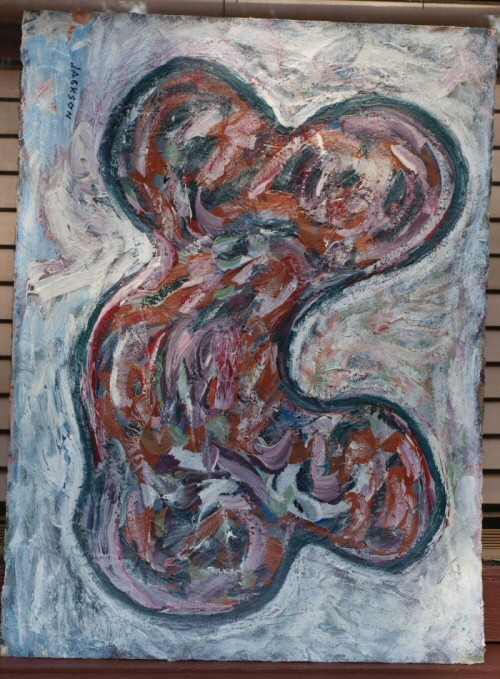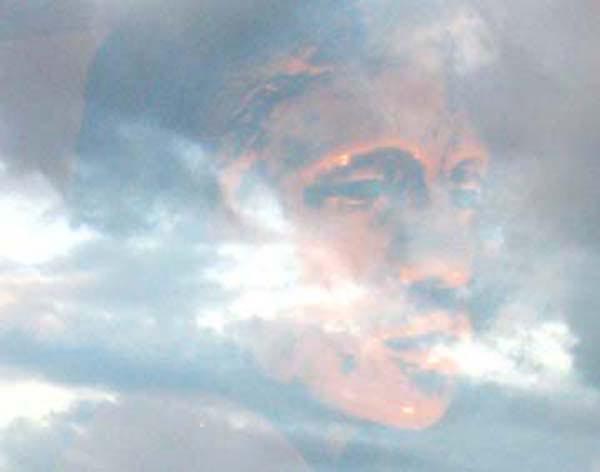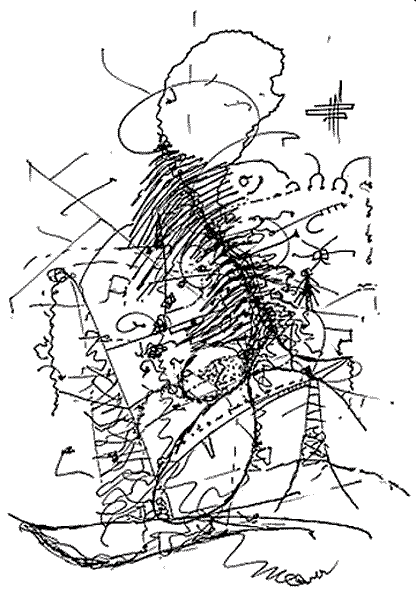|
Dusty Dog Reviews The whole project is hip, anti-academic, the poetry of reluctant grown-ups, picking noses in church. An enjoyable romp! Though also serious. |
|
Nick DiSpoldo, Small Press Review (on Children, Churches and Daddies, April 1997) Children, Churches and Daddies is eclectic, alive and is as contemporary as tomorrow’s news. |



|
Kenneth DiMaggio (on cc&d, April 2011) CC&D continues to have an edge with intelligence. It seems like a lot of poetry and small press publications are getting more conservative or just playing it too academically safe. Once in awhile I come across a self-advertized journal on the edge, but the problem is that some of the work just tries to shock you for the hell of it, and only ends up embarrassing you the reader. CC&D has a nice balance; [the] publication takes risks, but can thankfully take them without the juvenile attempt to shock. |
|
from Mike Brennan 12/07/11 I think you are one of the leaders in the indie presses right now and congrats on your dark greatness. |
Volume 236, Septembr 2012
Internet ISSN 1555-1555, print ISSN 1068-5154

see what’s in this issue...
Note that in the print edition of cc&d magazine, all artwork within the pages of the book appear in black and white.
|
Order this issue from our printer as a a $7.87 paperback book (5.5" x 8.5") perfect-bound w/ b&w pages |

poetry
the passionate stuff
Fatal AttractionLinda Webb Aceto
Cliffs chiseled in time,
|
| Janet Kuypers reads the Linda Webb Aceto September 2012 (v236) cc&d magazine poem Fatal Attraction |

See YouTube video of Janet reading this poem straight from the September 2012 issue (v236) of cc&d magazine, live 9/12/12 at Gallery Cabaret’s the Café Gallery open mic in Chicago) |

On the Lack of Reading ComprehensionMichael Ceraolo
Specifically,
|

I’m lying on the grate where the steam comes up.Fritz Hamilton
I’m lying on the grate where the steam comes up.
Then all day I sit in Union Stn like waiting for a train,
Sometimes I’m sitting in the library with a book
On Thursdays the Art Institute is free.
spending a Chicago winter night behind the Post Office.
Soon it’s Spring, & you can get rained on before !
|
When the roach pins Jesoo to the floorFritz Hamilton
The roach pins Jesoo to the floor
It catches in Jesoo‘s teeth, &
Rick Perry gets shoved down Jesoo‘s throat,
The roach dines on Jesoo‘s tongue,
Jesoo‘s freed by Magdalene his whore.
The apocalypse falls with nuclear bombs, & !
|
The Music Shades The SunRobert D. Lyons
Somebody’s dead symphony
|
A Pleasant FantasyJoseph Hart
Upon the hospice tablature
|
JordanJoseph Hart
I went into Denny’s,
|
| Janet Kuypers reads the Joseph Hart September 2012 (v236) cc&d magazine poem Jordan |

See YouTube video of Janet reading this poem straight from the September 2012 issue (v236) of cc&d magazine, live 9/12/12 at Gallery Cabaret’s the Café Gallery open mic in Chicago) |
There in Place of ‘On’Brian Looney
I pressed the button, and it didn’t respond. I tried again, a dry click again. It was there in place of ‘on.’ I have to wonder when things quit. I have to wonder about the timing. Material goes, snaps at a point. But I need detail. The day, the hour, the second. When and why it coughed up blood. When and why it doesn’t last. If it has a purpose, even.
What’s the point of a routine if little things disrupt?
|
TruthI.B. Rad
“Truth” is popularly portrayed
|
| Janet Kuypers reads the I.B. Rad September 2012 (v236) cc&d magazine poem Truth |

See YouTube video of Janet reading this poem straight from the September 2012 issue (v236) of cc&d magazine, live 9/12/12 at Gallery Cabaret’s the Café Gallery open mic in Chicago) |
The CorpseHarlan Richards
The officers rushed to my cell
|
| Janet Kuypers reads the Harlan Richards September 2012 (v236) cc&d magazine poem the Corpse |

See YouTube video of Janet reading this poem straight from the September 2012 issue (v236) of cc&d magazine, live 9/12/12 at Gallery Cabaret’s the Café Gallery open mic in Chicago) |
CutStaci Leigh
Your words cut me like a knife
|
 |
| Janet Kuypers reads the Staci Leigh September 2012 (v236) cc&d magazine poem Cut |

See YouTube video of Janet reading this poem straight from the September 2012 issue (v236) of cc&d magazine, live 9/12/12 at Gallery Cabaret’s the Café Gallery open mic in Chicago) |
Surface Reflects BeingSheila Cremin
I am a mirror, a window,
|

Abstract Mouse Painting, art byDavid Michael Jackson
Point ClickRobin Fine
FLIRTY GIRL 152
BEARS FAN 101
DADDY’S LITTLE GIRL
LADIESMAN 69
DEEPER MEANING 10
RACHEL’S DAD #1
NO MATCHES FOUND
|
| Robin Fine readsher poem Point Click |

Watch the YouTube video of Robin Fine reading this poem at the open mic 8/15/12 at Gallery Cabaret’s the Café Gallery in Chicago |

Back RoomJames B. NicolaSome men call her by the nickname they dreamt up when she was young and a looker: Bliss. But now her chest’s uneven, one boob gone, the other repaired, her teeth that are left have turned brown, and she wafts pungent. . . . Well she doesn’t douche as religiously now. She parks it by a table in the rear, the customer comes up and pays his Washington, Hamilton or Franklin, and she lays him in the back room. One or two are from the old days, they remember what they used to call her, but once I asked her her real name. Oh yea, I said. I’d forgotten that she’d told me years ago, when I was young. I asked her which she’d prefer. Prefer for what? she said. For me to call you. —Oh, Honey, it don’t matter. Faith is just a name. Whatever you call me, you know what I am.
|
an Appropriate HellRichard Fein
Never made much sense to me
|
Carried on a BreezeMaria J. Malone
The trees whisper a secret on a morning breeze
And bury every care you brought there in the sand
When you have already tasted the salt from the sea To lose yourself completely in breeze, sea, and sand.
|

Gilded, art by Peter LaBerge
My Past PortraitAnna Calubayan
I need to find a way
I wish I could find a way
I still dream of finding a way
I doubt I’ll ever find a way
I know I won’t be able to find a way
No matter how much I keep wishing,
|
guzzling drug cocktails
Janet Kuypers |
| Janet Kuypers reads guzzling drug cocktails with champagne |
| Rather read it? Then read the original writing |

Watch the YouTube video of Kuypers reading this poem at the open mike 2/29/12 at Gallery Cabaret’s the Café Gallery in Chicago (w/ music from the HA!man of South Africa) from the house camera |

Watch the YouTube video of Kuypers reading this poem at the open mike 2/29/12 at Gallery Cabaret’s the Café Gallery in Chicago (w/ music from the HA!man of South Africa) from the Kodak camera |
Love Affair With The Moon 2012Janet Kuypers(based on the 2005 poem Love Affair With The Moon and originating from the prose How Do I Get to the Moon in the 20050215 feature How Do I Get There?, but revised and edited 20120308)
how do we understnad this love
I think everyone loves the moon
scientists at NASA during the cold war
but what would that do to our weather, or our orbit?
and they say commting nuclear atrocities on the moon
our calendars have leap years
astronomers now estimate
so if you remember the moon looking so big
astronomy is like a forbidden love affair
it is something one person may never actualy touch
|
| Janet Kuypers reads Love Affair With The Moon 2012 |

Watch the YouTube video of this poem read live in her Pilsen feature “Games We Play” 3/17/12 at Café Mestizo (music from Francois Le Roux, the HA!man of South Africa) |

See feature-length YouTube video of many poems read 3/17/12 at Café Mestizo from the live feature “Games We Play”, w/ this poem |
grandmother
Janet Kuypers |
| Janet Kuypers reads grandmother charged with murder |

Watch the YouTube video of this poem read live in her Pilsen feature “Games We Play” 3/17/12 at Café Mestizo (music from Francois Le Roux, the HA!man of South Africa) |

See feature-length YouTube video of many poems read 3/17/12 at Café Mestizo from the live feature “Games We Play”, w/ this poem |
You Moved
Janet Kuypers |
| Janet Kuypers reads You Moved from Island to Island |

Watch the YouTube video of Kuypers reading this poem from her book Stabity Stabity Stab Stab Stab at the open mike 4/11/12 at Gallery Cabaret’s the Café Gallery in Chicago (w/ music from the HA!man of South Africa) |

Watch the YouTube video of Kuypers’ open mike 4/11/12 at Gallery Cabaret’s the Café Gallery in Chicago, plus the entire open mike, w/ this poem (w/ music from the HA!man of South Africa, & piano from Gary) |
Janet Kuypers Bio
Janet Kuypers has a Communications degree in News/Editorial Journalism (starting in computer science engineering studies) from the UIUC. She had the equivalent of a minor in photography and specialized in creative writing. A portrait photographer for years in the early 1990s, she was also an acquaintance rape workshop facilitator, and she started her publishing career as an editor of two literary magazines. Later she was an art director, webmaster and photographer for a few magazines for a publishing company in Chicago, and this Journalism major was even the final featured poetry performer of 15 poets with a 10 minute feature at the 2006 Society of Professional Journalism Expo’s Chicago Poetry Showcase. This certified minister was even the officiant of a wedding in 2006. |

prose
the meat and potatoes stuff
The RopeJim Meirose
The rotting pickup truck pulled up in front of the abandoned farmhouse. Walter and Lucas got out and stepped toward the well in the bare dirt front yard.
A blanket of stars hung far above startled the opening eyes. The hand came up from somewhere and rubbed the throbbing head. The bed spread cold under him. Why was the bed so hard and cold? The mild breeze flowing over ran chills throughout his body. Lord God, he muttered as he slowly rolled ontao his side. Lord God, my head. The bed became hardpacked earth—and the house appeared, looming over in the silent nighttime dark.
|
Chained in MemoriesCynthia Mortimer
My husband and I reached an age when our priorities changed. Our house in the country tended to annoy us when our voices echoed and the quiet was no longer peaceful, but tedious. Our daughter was grown and living in the city. Charlie, my husband, was diagnosed with prostate cancer. At “stage two” the prognosis was optimistic, but living away from hospitals and our only daughter no longer appealed to us.
|

What Do You See, art by Cheryl Townsend
Happy ThoughtsBob Johnston
The day didn’t start out too badly. In fact, I was pretty happy with the world when I awoke. The brown smog that had hung over our valley for two weeks was gone, washed away by last night’s rain. Half a rainbow lit up the western sky. I opened my bedroom window and inhaled the sweet air.
Now I’m locked up at the State Hospital, and I have these stupid psychiatrists poking at me every day. I try to explain, but they’re too dumb to see the black thing on my back.
|
Bob Johnston BioBob Johnston is a retired petroleum engineer and translator of Russian scientific literature. He waited until his sixtieth year to start writing fiction and poetry, and over the next thirty years he has been trying to catch up. He lives in the original Las Vegas, New Mexico with his wife, three cats, and some hope of completing his memoirs and the Great American Novel.
|

Disintergage, drawing by the HA!man of South Africa
Moving Her WorldMargaret Karmazin
The crowd was considerable, and not one Natalie relished being part of since its political leanings were the opposite of her own. It was all she could do to refrain from screaming, in particular at the obese, straw-haired blonde to her right waving the God-Hates-Fags sign, or at the Obama-Half-Breed “Muslin” placard to her left. Not to mention the Respect- “Are”- Country-Speak-English waver behind her.
For years, Natalie had flirted with the idea. She remembered lying in bed before they sold the old house and staring at a vase of dried grasses on top of an antique wardrobe. While her husband snored, she wondered what would happen if by her mind alone she caused the fronds to move.
She returned to an empty house, nothing unusual now, and had to remind herself it was Thursday, one of Rob’s regular nights out. Nothing to be upset about and even good to have the time alone to digest what had occurred. She craved a martini, but her heart was already thumping erratically, so she sipped tea instead. The cat did not jump into her lap as usual - did he sense somehow that she had morphed into a monster? She grabbed the remote to flick on the news.
|
Rapunzel’s HairRex Sexton
Dusk, and once again, the dream-like grapple with death, as high winds howled across the South Dakota desert, and black rocks twisted in a devil dance against the sky.
Headlights swept the driveway. A dark, late model car pulled in. Two shadows sat slumped in it. Greenleaf rose softly, slipping a revolver down his snakeskin belt, his gaunt Indian face expressionless.
“Fifty thousand dollars?” The Mexican asked again.
Headlights swept across the roadhouse parking lot. A champagne colored Cadillac sped past them and parked by the neon-lit door. Two men in suede suits and Stetson hats climbed out. They looked around and went inside. One of the men was carrying a briefcase.
A white silk suit, a diamond ring, a pocket full of money, his hair slicked back – Greenleaf was high rolling his way through the casinos of Las Vegas, a blonde on each arm. The girl sat in the dark and waited for her lover. Soon, he would appear to her, as he always did, in the antique barroom mirror. Tall, dark, handsome, elegant, he would be dressed for their wedding in that high style gold rush fashion which gentlemen wore for their ladies way back then. The roadhouse was theirs now, theirs alone. Her father was gone. Her uncle was gone. They were gone in the way they both deserved. There would be no more of that from them. There would be no more rooms with drunken men. There would be just her and her lover from now until forever.
|
Romantic As It Should BeWill PewittErwin and Deidre have just picked me up for the threesome I agreed to last week. We’re going out for Italian food first and he and I are a bit overdressed: Erwin wears an ugly grey shirt, striped with blue and gold patterns, which, despite being hideous, complements his cigar-skin and light eyes. I sit in the backseat on the way, watching Erwin carefully eyeing the road. Whenever I’ve driven with him before, he has been loose and talkative—what you want in a comfortable, casual acquaintance. But when they picked me up his voice was jittery, his movements stilted; his responses to basic questions came after long deliberation. Then he began overcompensating, trying to sound in-control, and I’m sure he keeps thinking, What should I say to a man who’s about to sleep with my wife?
I’ve known Erwin about three years. We had worked in the same office for a little less than a year until I took a job at a rec center after my wife left me. When we worked together, Erwin and I commiserated with each other’s entry-level jobs at the stock brokerage firm, complaining about the duties, the tedious input of numbers, and the rookie positions we had, trying to understand the way things worked inside the heads of men and women who made our salaries in a week—all while trying not to seem jealous, trying not to look stupid when we asked questions. We fetched Red Bull, brought back barbeque and each wore our five ties on the same days of the week the entire time we worked together. The people we dealt with at the firm were the types who go have martinis and say, “There are things in life besides money,” and then laugh raucously.
“Slow down,” Deidre says to him now. “I think you missed your turn, babe.”
We pull up to the restaurant soon, and as Erwin and I start to unbuckle Deidre says, “I feel like we should get to know each other a little bit first.”
|
Will Pewitt bioWill Pewitt lives in St. Augustine, FL and teaches at Flagler College and the University of North Florida. His fiction has been published in over a dozen national journals and can be reached at will.pewitt@gmail.com.
|

Le Monde image 107, art by Aaron WilderAaron Wilder


Debra Purdy Kong, writer, British Columbia, Canada I like the magazine a lot. I like the spacious lay-out and the different coloured pages and the variety of writer’s styles. Too many literary magazines read as if everyone graduated from the same course. We need to collect more voices like these and send them everywhere.
Children, Churches and Daddies. It speaks for itself. Write to Scars Publications to submit poetry, prose and artwork to Children, Churches and Daddies literary magazine, or to inquire about having your own chapbook, and maybe a few reviews like these.
what is veganism? A vegan (VEE-gun) is someone who does not consume any animal products. While vegetarians avoid flesh foods, vegans don’t consume dairy or egg products, as well as animal products in clothing and other sources. why veganism? This cruelty-free lifestyle provides many benefits, to animals, the environment and to ourselves. The meat and dairy industry abuses billions of animals. Animal agriculture takes an enormous toll on the land. Consumtion of animal products has been linked to heart disease, colon and breast cancer, osteoporosis, diabetes and a host of other conditions. so what is vegan action?
We can succeed in shifting agriculture away from factory farming, saving millions, or even billions of chickens, cows, pigs, sheep turkeys and other animals from cruelty. A vegan, cruelty-free lifestyle may be the most important step a person can take towards creatin a more just and compassionate society. Contact us for membership information, t-shirt sales or donations.
vegan action
Children, Churches and Daddies no longer distributes free contributor’s copies of issues. In order to receive issues of Children, Churches and Daddies, contact Janet Kuypers at the cc&d e-mail addres. Free electronic subscriptions are available via email. All you need to do is email ccandd@scars.tv... and ask to be added to the free cc+d electronic subscription mailing list. And you can still see issues every month at the Children, Churches and Daddies website, located at http://scars.tv
MIT Vegetarian Support Group (VSG)
functions: We also have a discussion group for all issues related to vegetarianism, which currently has about 150 members, many of whom are outside the Boston area. The group is focusing more toward outreach and evolving from what it has been in years past. We welcome new members, as well as the opportunity to inform people about the benefits of vegetarianism, to our health, the environment, animal welfare, and a variety of other issues.
Dusty Dog Reviews: These poems document a very complicated internal response to the feminine side of social existence. And as the book proceeds the poems become increasingly psychologically complex and, ultimately, fascinating and genuinely rewarding.
Dusty Dog Reviews: She opens with a poem of her own devising, which has that wintry atmosphere demonstrated in the movie version of Boris Pasternak’s Doctor Zhivago. The atmosphere of wintry white and cold, gloriously murderous cold, stark raging cold, numbing and brutalizing cold, appears almost as a character who announces to his audience, “Wisdom occurs only after a laboriously magnificent disappointment.” Alas, that our Dusty Dog for mat cannot do justice to Ms. Kuypers’ very personal layering of her poem across the page.
Fithian Press, Santa Barbara, CA Indeed, there’s a healthy balance here between wit and dark vision, romance and reality, just as there’s a good balance between words and graphics. The work shows brave self-exploration, and serves as a reminder of mortality and the fragile beauty of friendship.
Mark Blickley, writer You Have to be Published to be Appreciated. Do you want to be heard? Contact Children, Churches and Daddies about book or chapbook publishing. These reviews can be yours. Scars Publications, attention J. Kuypers. We’re only an e-mail away. Write to us.
The Center for Renewable Energy and Sustainable Technology The Solar Energy Research & Education Foundation (SEREF), a non-profit organization based in Washington, D.C., established on Earth Day 1993 the Center for Renewable Energy and Sustainable Technology (CREST) as its central project. CREST’s three principal projects are to provide: * on-site training and education workshops on the sustainable development interconnections of energy, economics and environment; * on-line distance learning/training resources on CREST’s SOLSTICE computer, available from 144 countries through email and the Internet; * on-disc training and educational resources through the use of interactive multimedia applications on CD-ROM computer discs - showcasing current achievements and future opportunities in sustainable energy development. The CREST staff also does “on the road” presentations, demonstrations, and workshops showcasing its activities and available resources. For More Information Please Contact: Deborah Anderson dja@crest.org or (202) 289-0061
Dorrance Publishing Co., Pittsburgh, PA want a review like this? contact scars about getting your own book published.
 The magazine Children Churches and Daddies is Copyright © 1993 through 2012 Scars Publications and Design. The rights of the individual pieces remain with the authors. No material may be reprinted without express permission from the author. 
Okay, nilla wafer. Listen up and listen good. How to save your life. Submit, or I’ll have to kill you.
Dorrance Publishing Co., Pittsburgh, PA: “Hope Chest in the Attic” captures the complexity of human nature and reveals startling yet profound discernments about the travesties that surge through the course of life. This collection of poetry, prose and artwork reflects sensitivity toward feminist issues concerning abuse, sexism and equality. It also probes the emotional torrent that people may experience as a reaction to the delicate topics of death, love and family. “Chain Smoking” depicts the emotional distress that afflicted a friend while he struggled to clarify his sexual ambiguity. Not only does this thought-provoking profile address the plight that homosexuals face in a homophobic society, it also characterizes the essence of friendship. “The room of the rape” is a passionate representation of the suffering rape victims experience. Vivid descriptions, rich symbolism, and candid expressions paint a shocking portrait of victory over the gripping fear that consumes the soul after a painful exploitation.
Dusty Dog Reviews (on Without You): She open with a poem of her own devising, which has that wintry atmosphere demonstrated in the movie version of Boris Pasternak’s Doctor Zhivago. The atmosphere of wintry white and cold, gloriously murderous cold, stark raging cold, numbing and brutalizing cold, appears almost as a character who announces to his audience, “Wisdom occurs only after a laboriously magnificent disappointment.” Alas, that our Dusty Dog for mat cannot do justice to Ms. Kuypers’ very personal layering of her poem across the page.
|